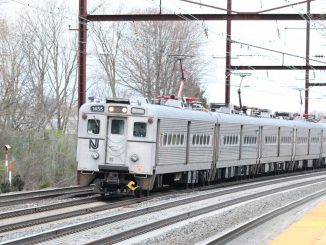
NJ Transit is close to hiring a customer advocate to fill an oversight post that has been vacant for nearly four years, one of the agency’s board members said Wednesday.
The post, created by a 2018 law meant to reform the transportation agency, has remained vacant since Stewart Mader resigned from it in October 2020 amid criticism that he acted more as a spokesperson for the agency than an advocate for its riders.
“I just want to say in response to the several people who raised the issue of the customer advocate that the hiring of a public advocate is in its final stages, and that’s all the information I can give at this time,” NJ Transit board member Shanti Narra said near the end of the board’s monthly meeting, which included a public call for her resignation over the hiring delays.
Under the 2018 law, the customer advocate is required to annually report to NJ Transit facility improvements, the results of customer surveys, and on-time performance statistics, among some other things.
A job posting for the position — which is now closed — said the customer advocate would also be responsible for overseeing the agency’s passenger advisory committees and act as a conduit for rider feedback.
Riders have regularly urged the agency to fill the post at monthly meetings, calls that redoubled after the board approved fare hikes this spring and amid spotty reliability this summer.
“The NJ Transit Board stole our customer advocate. How dare you? Give us a customer advocate,” Andy Weiss, a commuter, told the board Wednesday
Officials have for months said they were close to filling the post. Past pushes to fill the role — the most recent attempt is the third in as many years — have failed to draw qualified candidates, agency and state transportation officials have said.
The board recommended a candidate for the position in March, and it isn’t unusual for public-sector hires to take months to finalize.
Former state Sen. Loretta Weinberg, who authored the 2018 bill, said she believes the delays are intentional and meant to limit rider feedback.
“The post was created to be a voice for the riders, so if it’s been left vacant all of these years purposefully — because that’s the only thing you can read out of this, that it was purposefully left vacant — then you don’t want such a position on behalf of the riders,” she said.
Meanwhile, a bipartisan group of legislators is attempting to bolster independent oversight of NJ Transit. Committees in both chambers earlier this year unanimously advanced a bill that would create an independent Rider Advocacy Commission to oversee a new Office of the Customer Advocate akin to the Office of the Ratepayer Advocate, which lobbies for utility customers’ interests.
That bill, which awaits budget committee hearings in both chambers, would remove the oversight position from NJ Transit’s corporate structure and expand the customer advocate’s authority, allowing them to hire staff, advocate on riders’ behalf on fare increases and service changes, and conduct investigations and studies.
Under current law, the customer advocate reports to NJ Transit’s board.
“The position that exists now reports to the people they’re supposed to hold accountable. The whole point is to ensure that the customer advocate actually has autonomy and doesn’t report to New Jersey Transit, but rather to the elected officials who have to answer to our constituents,” said bill sponsor Sen. Raj Mukherji (D-Hudson).
The extended vacancy in the existing customer advocate post was “distressing” because there was no other official whose sole purpose was to champion riders’ interests, Mukherji said. He has requested the bill be heard by budget panels this fall, adding he is “optimistic that it’ll continue to advance once we’re back in Trenton.”
Weinberg said that having the customer advocate report to the NJ Transit board was done by design. But she added that a winnowing of dissident board members like James Adams — who was frequently the lone no-vote on board matters and was not renominated when his term expired in late 2022 — in the years since the law’s passage had undercut the oversight the law added.
“The object, of course, was to create a New Jersey Transit board that would be independent and would hold the bureaucracy accountable,” Weinberg said. “That was completely undermined when some folks left on their own accord and others left because they knew they wouldn’t be reappointed.”
— Nikita Biryukov
This article was published by the New Jersey Monitor and is republished here with permission. Click here to view the original.





